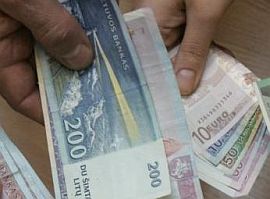Analytics, EU – Baltic States, Financial Services, Lithuania, Markets and Companies, Society
International Internet Magazine. Baltic States news & analytics
Friday, 19.04.2024, 07:02
Politicians and businessmen support euro in Lithuania, most residents don’t
 Print version
Print version |
|---|
The main reason for this – business would save around LTL 100 million (EUR 29 million) for currency conversion annually. The fact that the country would have to pay about LTL 5 billion (EUR 1.4 billion) to the euro area funds does not concern them.
In an interview with Respublika Head of the Lithuanian Confederation of Industrialists Vladas Sutkus claims that the introduction of the euro would bring more benefits than disadvantages. "Advantages are such as belonging to the common currency area. It is saving the expenditures for currency exchange. It is also a good piece of news to investors. Perhaps it is not much important to the old EU countries, yet for Lithuania it means very positive news for other foreign investors. The introduction of the euro would by a positive message that would increase the prestige of Lithuania and assist in attracting investment," said Sutkus.
When asked if one could expect that salaries would be increased in case of price rise, Sutkus said he thought that the euro introduction would be a good motivation for employees "to ask for a bigger salary." "Let's do not forget that the current salary will have to be divided from 3.45. Therefore, if now you receive LTL 3,000 (EUR 868.86), you will not earn even a thousand euro. It has to do with psychology. It will seem that you are earning several times less. In addition, it will be easier to raise salaries paid in Lithuania and in other euro area countries. It will also be a reason to ask for pay rise since a huge disparity will be observed."
Despite huge euro propaganda, the Flash Eurobarometre survey revealed that 55% of Lithuanians are against the introduction of the euro, while 41% of those polled were for it and the rest had no opinion. 47% of resident would want that the euro adoption would be postponed for as long as possible. 75% of those polled are afraid of possible misuse in determining prices after the euro adoption, whereas 48% are sure that abandoning the litas would cause them personal inconveniences. 80% of Lithuanians are sure that prices will rise after the euro adoption. Only 14%s of those polled think that the euro would provide stability for prices. 47% of Lithuanians believe that the outcomes of the euro adoption would be negative for them personally, while 55% think that euro adoption would negatively affect the country.
Lithuania's Minister of Finance Rimantas Sadzius is very happy since according to him, the development of Lithuania's economy allows hoping that the country will satisfy the Maastricht criteria and will adopt the euro in 2015. The minister calls it a possibility for acknowledgment of the country, yet he forgets how much the changeover would cost. The latter fact does not bring much joy to many Lithuanians. At the conference Euro and the 2014 Budget: What to Expect Next Year on Monday, the minister highlighted that the current tendencies of the economy were favourable for the euro adoption and vice versa – the euro adoption was favourable for the country's economy. "The membership in the eurozone is the acknowledgment of the country's reliability. We will not gain this acknowledgement, if we are not treated as the reliable. Now the economy growth is favourable for the euro adoption and vice versa – the euro adoption would be favourable for our economy as well," said the minister. According Sadzius, Lithuania in the context of the Maastricht criteria seemed favourable because it was forecasted that the budget deficit at the end of the year was to reach 2.9% and the state's finances should be balanced in 2016.
Yet the possibility that prices for goods and services will rise is not ruled out. During the changeover the country should spent about LTL 660-920 million (EUR 191-266 million), writes Vakaro zinios.
In addition, after the euro adoption Lithuania should contribute about LTL 1 billion (EUR 290 million) to European Stability Mechanism within five years, if there will be a need the sum of contribution would amount to EUR 2.5 billion. Another LTL 43 million (EUR 12.5 million) Lithuania will have to pay to the European Central Bank. Lawyer, politician Zita Slicyte says that everyone forgets how much it will cost to adopt the euro. "Who will pay for that? Of course, it will not be the rich, it will be the common, poor people," says Slicyte.








 «The Baltic Course» Is Sold and Stays in Business!
«The Baltic Course» Is Sold and Stays in Business!

